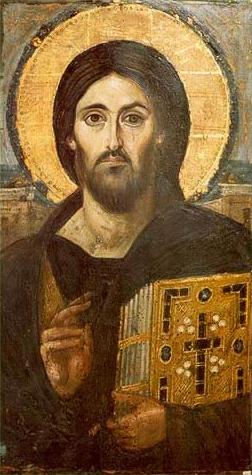
When Constantine defeated his rival Maxentius at the Milvan Bridge in the battle for Roman and its Empire in the West, Constantine was indeed the victor. Maxentius, a brutal and ambitious general, drown in the Tiber River during the chaos of the battle. It was the beginning of Constantine's identification of himself as a Christian. In January, 313, he agreed with Licinius the new Emperor in the East, to issue an edict, the Edict of Milan, to legally recognize Christianity as a religion. This marks a turning point in the history of the Church and of Europe. Constantine’s letters from 313 on leave no doubt that he considered himself a Christian who believed his imperial duty was to maintain the unity of the Church.
His writings show that he genuinely believes it was the true religion as does his legislation favoring Christianity (though he did not outlaw paganism). Shortly after his great victory he said that he owed the Christian “God my whole soul, every breath and every stirring of my mind, wholly and completely.” He said that Christianity was the divine law and he consecrated himself for fighting for the causes of the Christian God. But this presented a challenge because he chose to remain an unbaptized cateuchmen until shortly before his death and all too often allowed his political dominance to take steps that should have been those of the Church to handle.
Constantine wanted to promote Christianity and protect its unity, but was misguided. This has led some critics of the Catholic Church to allege that Catholicism emerged with the Emperor Constantine, because some people equate Catholicism (which they distinguish from “Christianity”) with the Church in the Middle Ages, where you have unity of Church and state. So they say claim that before Constantine there was zealous biblical Christianity (the persecuted Church), but after Constantine it became the state religion, cultural Christianity (not because of true belief in Christ). This equating of Constantine with Catholicism is an error because the basic structure of the Church and the initial creeds were already being formulated before Constantine and the faith that was embraced was decided upon without the emperors, even though they did their best to try to manipulate and maneuver the debate. Ultimately it was God who triumphed because it was the bishops and not the emperors who determined the shape of the Church.
For example, let's look at the Nicene Council which created an orthodox creed for the Church at a time when the divinity of Christ was being undermined by the Alexandrian priest, Arius, after whom the heresy of Arianism is named. Arius may have good motives in wanting to protect the unity of God, but unfortunately believing that the Son of God could not be fully equal to the Father, but must be the highest, most perfect creature of God. He believed that there was once a time when the Son was not (i.e., he was a created creature of God). He denied the divinity of Christ (and also of the Holy Spirit). As early as 320 or 321 St. Alexander, Bishop of Alexandria, convoked a council at Alexandria at which more than one hundred bishops from Egypt and Libya anathematized Arius.
Constantine called the Council of Nicaea in 325 A.D. (after defeating Licinius and unifying the empire) which condemned Arius’ position and adopted the term homoousis or homoousion (of the same substance). [Pope Dionysius (260-268) had used the term homoousios (or consubstantial) to correct Bishop Dionysius of Alexandria, who had gone too far in combating Trinitiarian heresies and was presenting Christ as a lesser divinity.] The Nicene Creed passed almost unanimously, but for the opposition led by Euseubius of Nicomedia, who was later deposed. For the next 60 years the arguments persist. The idea of an ecumenical council being the last word was not yet understood. The word homoousis was not a biblical term, but the main reason for the arguments were the political influence exerted by followers of Arius. Constantine himself, was swayed by one of his advisors, Bishop Valens, and changed his position though he never changed the doctrine of the Church.
On the contrary, the battle continued into the reigns of his son Constantius and later Valens, both avowed Arians. Arianism was a great apostasy, but the common people never embraced it, and the Catholic Church prevailed in the long struggle, led by St. Athanasius, Bishop of Alexandria and St. Basil the Great, key bishops who maintained the integrity of the Church's Trinitarian theology as annunciated at the Council of Nicaea despite the overt threats and intimidation of the Arian emperors just mentioned.
As Rod Bennett concludes in his 2015 book, The Apostasy that Wasn't: The Extraordinary Story of the Unbreakable Early Church:
"The Nicene party, on the other hand, was the party of the common herd, the hoi polloi, both the Christian laity and their democratically minded well-wishers. And their creed, laid out at the very start of the crisis, before any tampering had ever begun, expressed the faith of these common folk--which is why it succeeded. The Nicene Creed, in other words, was actually the great roadblock to the paganization of Christianity in the age of Constantine--and the Great Apostasy is exactly what its champions were struggling (and suffering) to prevent" (p.287).
Paganism really did make an assault on Christianity (Catholicism) during the fourth century and caesaropapism (Caesar trying to be the pope or vicar of Christ) was a real challenge but the Church and not the Arians prevailed. As Bennett wrote, "The Church was Catholic because it was intended by its divine founder [Jesus Christ] to be universal--found everywhere, united wherever it was found, meant for everyone, the new spiritual home of humanity."
Bennett continues, "The same Church was Orthodox because it was "right-thinking" in matters of the Faith--because it believed and proclaimed the unspoiled doctrine of its divine founder as he taught it to the apostles [orally] and that was passed down by them to future generations."
There was no great apostasy of true Christianity. Reading the thousands of pages of the Early Church Fathers, including among them Athanasius and Basil the Great, makes it abundantly clear that the Church Christ established lived both before and after the time of Constantine as it does today. It relies on the words of Christ, who promised to Peter and to all of us, "And I tell you, you are Peter and on this rock, I will build my Church and the gates of Hades shall not prevail against it. I will give you the keys to kingdom of heaven, and whatever you bind on earth shall be bound in heaven, and whatever you loose on earth shall be loosed in heaven" (Matthew 16: 18-19).
Jesus also said, "I will ask the Father and he will give you another Paraclete to be with you always; the Spirit of Truth, whom the world cannot accept, since it neither sees nor recognizes him, but you can recognize him because he remains with you and will be within you" (John 14:16).
 RSS Feed
RSS Feed

